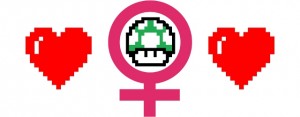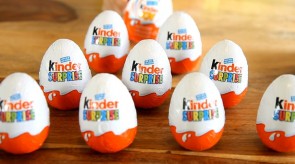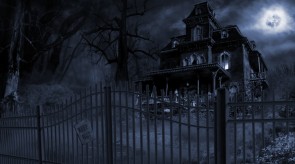It’s not difficult to define the term ‘geek girl’. It’s pretty self-explanatory: a female who enjoys that which is considered ‘geeky’. The term ‘geek’ has been widely reclaimed from its negative schoolyard insult into a moniker which I, and many of my friends, am proud to display.
I asked blogger GeekGirlDiva why some geeky women felt like they needed to identify themselves as geek girls rather than simply a geek, and she suggests that it is for a number of varying reasons.
“Part of it is about owning our geekdom. Part of it is about enjoying it. Part of it is because we felt for so long that people thought we didn’t exist. Part of why I started identifying that way was because I wanted geek boys to know there were girls out there who liked what they liked.”
But when and where did this term originate? It’s difficult to pin down exactly, but it’s easy to find out when it transcended into mainstream use.
San Diego, 22nd July 2010. The day that shook the internet…
A group of geeky women took to the panel room 8 for a panel entitled Geek Girls Exist. Moderated by Kristin Rielly of GeekGirlsNetwork.com, the panel consisted of a veritable who’s who of the geek world – Bonnie Burton, Morgan Romine, Marian Call, Kari Byron, Veronica Belmont, Sarah Kuhn, Kiala Kazebee and Jill Pantozzi. The main objective of the panel was to prove, most definitely, that geeky girls do exist and they’re just as geeky as their male counterparts. The term “geek girl” and its widespread recognition as a community are attributed to the success of this panel.
In researching this article, I decided that I’d like to find out just how many geeky women use the term ‘geek girl’ to describe themselves. In the survey, the first question I posed was “I prefer to be called… a) a geek b) a geek girl or c) other (please specify)”. What’s most interesting is that out of the 150 responses to this question, 56% said “a geek”, only 28% said “geek girl” with the other 16% choosing “other” with the most common among this 16% being “nerd”. With the terms nerd and geek more commonly being used interchangeably, if we add the percentage that chose “nerd” to geek, we have a far bigger majority. But with such a seemingly empowering, or at the very least not demeaning, term as “geek girl”, why do the majority of the women I surveyed not identify themselves as one?
Is it because they simply don’t like to identify as a ‘geek girl’? Is it that they don’t agree with the term itself? Or is it the far more complicated issue of being that we are the diverse creatures that we are, that the whole is greater than the sum of its parts? I plump for the last option. And so does author and Star Wars/Lucasfilm blogger Bonnie Burton,
“I think women obsessed with which box they should check to identify themselves and others need to look at the bigger picture — why have a box to check at all? Be proud of WHO YOU ARE no matter what group or groups you fall into. You can be a sci-fi geek who loves bodice ripper novels and sports. So why pigeon hole yourself just to meet others’ need to put you in a box?”
It is therefore difficult, if not nigh on impossible, to find a term that everyone will identify with. “Geek girl” only stretches so far for some people, but the important thing is that they do exist. And they’re everywhere.
But now is the time that everyone started to respect them as geeks. Time and time again, I see geek girls being questioned about their “geek cred”. And it mostly stems from the fact that the geek girl in question “doesn’t look like a geek.” Who am I to say that someone isn’t a geek based purely on what they look like? What are geeks supposed to look like? If you take a walk down the street, does anyone you meet look exactly like the next person? No. So why is there an all-encompassing look for a geek?
And it boils down to the fact that unfortunately, geek culture can be extremely exclusive and elitist. They generally face the same basic problems and yet they still can’t support each other – even with an underlying common interest. Say what you will about fighting wars, on the internet, when it happens, geek warfare is the cruellest…
Team Unicorn (so called because geek girls, like unicorns, aren’t meant to exist) is made up of Michele Boyd, Milynn Sarley, Rileah Vanderbilt and Clare Grant. They set up shop in late 2010 as a multi-media production team and they have been making a number of funny short films and videos for the web ever since. The first of these videos was, G33K & G4M3R GIRLS a parody video of Katy Perry’s California Gurls. Achieving a million views in one week, the video has attained cult status online. And in doing so, they’ve stirred a lot of comments. It has mostly been praise for the video, but some of it has been incredibly nasty.
“It isn’t really about geek women at all — it’s just about how men would want to have a smoking hot girlfriend who can talk about Star Wars and play D&D with them. That’s all you need, right? A hot body and a willingness to watch anime?” – GeekFeminism
One of the main points of the criticism directed towards Team Unicorn and the G33K & G4M3R GIRLS video is that these women don’t represent real geek and gamer girls. It has been pointed out time and time again, but I’ll point it out once more for emphasis: these women are real gamers and geeks. They’re not models hired for their looks in order to pose as geeks so as to appeal to male geeks. Their geek credibility should never have come under scrutiny because a simple Google search will reveal that they’ve got just as much, if not more, than you or me.
Another, and far more important, point of discussion is the hostile response to the girls’ costumes. The larger issue being why are people so threatened by women owning their sexuality? Cosplaying is an important part of geekdom for many geeks. If you’ve ever attended a convention, you’ll realise just how many people partake in the practice. In G33K AND G4M3R GIRLS, we have Psylocke, The Baroness, Lara Croft and a female Han Solo.
I spoke to Jessica Mills, creator of the geeky webseries Awkward Embraces, to gather her thoughts on the subject of women criticising other women for wearing sexy outfits and she had this to say:
“Why is it so wrong for a woman to wear something she feels sexy in just because it makes her feel good? I know that a lot of people would say that they are just encouraging the objectification of women, but what’s the alternative? Dress like school marms? That doesn’t make me feel good. And I’ll be damned if I make a decision about what I do or what I wear based on whether or not some douchebag is going to objectify me. I could wear a paper sack and that would happen anyway. We can’t control that. It’s our prerogative to wear what makes us feel confident and good about ourselves. That is empowering and there is nothing wrong with that.”
If we ignore female Han Solo, we’ve got some incredibly powerful, kick-ass, and independent women. Yes, they dress in what you could call sexy outfits, but the outfit doesn’t make the person. Part of cosplaying is celebrating and owning that character’s personality. In an article for SFX Magazine in June this year, Bonnie Burton talked about feminism and cosplay. Her stance on it is “When Slave Leia choked Jabba the Hutt to death, I doubt she was second-guessing her commitment to feminism. As Wonder Woman lassoed the bad guys she didn’t stop to ponder if other girls were judging her legs. So why should the women who dress as these characters be treated any differently?” And the answer is they shouldn’t. So the next time you judge someone based on what they look like or what they’re wearing, think about the person they are. You don’t know them. You don’t know what they’ve been through. And just because they’re beautiful and sexy now doesn’t mean they always were.
Us geeks are the infinite diversity in infinite combinations. So whatever kind of geek you are, own that badge of honour. You’ve worked long and hard for it.
If I could, I’d be honoured to call myself a geek girl, to be part of a culture where respect reigns supreme, where no matter what your geek poison is, you can be part of something wonderful. That is the true meaning of “geek girl”.
—
Follow Pop Culture Monster on Twitter.
Follow Pop Culture Monster on Facebook.
—
I’d like to express my thanks to everyone who was involved in making this article possible. Particularly those of you who I interviewed and surveyed. In the interest of transparency, all the charts from the results of the survey can be found in handy PDF format here. Take a look if you fancy. I swear I spent time on them despite the fact that they look like crap.



